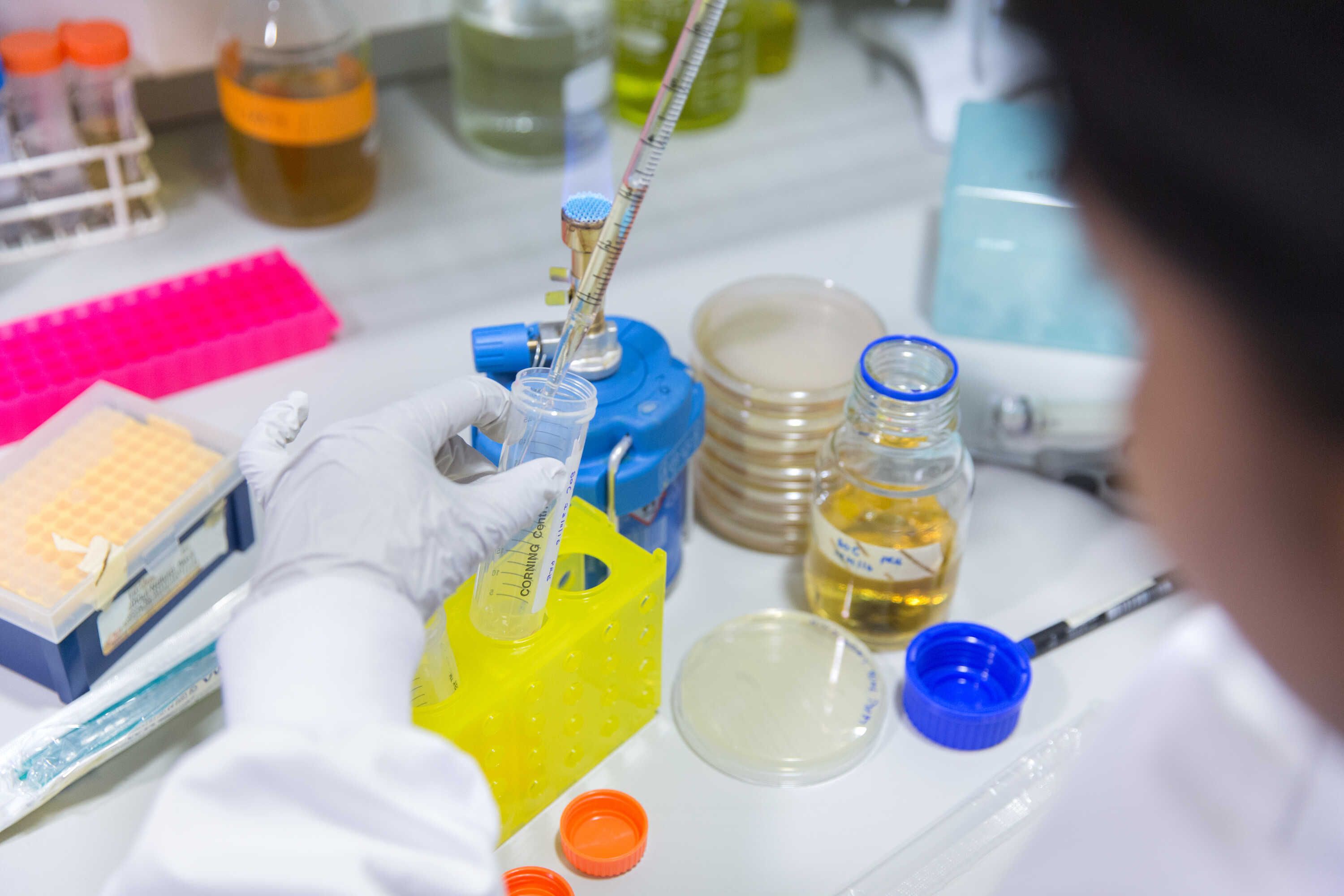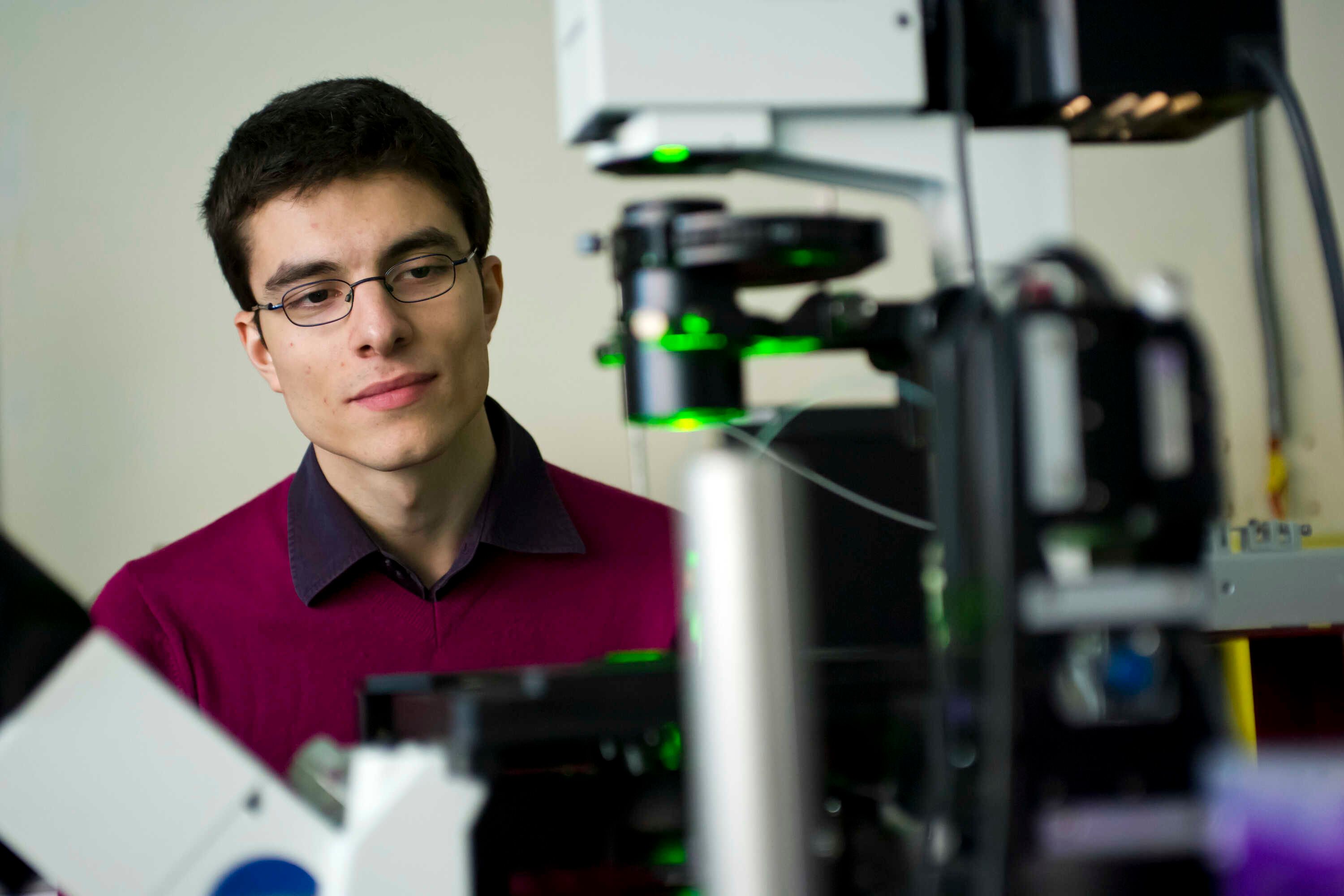
Systems and Synthetic Biology
Hands-on experience in experimental biology and modelling to understand, predict and redesign biological pathways.
Gain hands-on experience in experimental biology and modelling to understand, predict and redesign biological pathways
Explore emerging ethical, legal and societal issues within the area of systems and synthetic biology
Carry out an extended research project and forge close connections with experts in industry and medicine
Course key facts
Qualification
MRes
Duration
1 year
Start date
September 2025
Study mode
Full-time
-
Fees
£15,500 Home
£38,600 Overseas
Delivered by
Location
-
South Kensington
-
Minimum entry standard
2:1 in a physical sciences, engineering, mathematical, life or biomedical science based subject
Course overview
Learn to work collaboratively on the 'big problems' and applications in synthetic and systems biology on this Master's course.
You'll gain intensive hands-on experience in a combination of experimental biology and modelling in order to understand, predict and redesign biological pathways.
This course also links with the BIOS Centre at King's College to facilitate the integration of this research with emerging ethical, legal and societal issues.
You'll explore a range of topics covering key aspects of experimental systems biology, theoretical systems biology, synthetic biology, and advanced technologies. Teaching is delivered through practicals, case studies, proposal writing and journal clubs.
You'll also apply your skills to an eight-month interdisciplinary research project.
This will be in a study area of your choice and enables you to form close connections to experts working in industry and medicine.
Structure
This page is updated regularly to reflect the latest version of the curriculum. However, this information is subject to change.
Find out more about potential course changes.
Please note: it may not always be possible to take specific combinations of modules due to timetabling conflicts. For confirmation, please check with the relevant department.
You'll complete the following core modules.
Core modules
Become familiar with various modelling techniques, including dynamical systems, networks and deterministic differential equations, as well as statistical approaches.
Address social, ethical and policy issues in synthetic biology. Explore themes including how science links to society, biology in the political context, social challenges, and governance and regulation.
You’ll also apply the knowledge acquired from the course to a research project.
You’ll choose a topic and draft a proposal to be presented to a student panel.
The research proposal is then assessed toward your final degree grade by your supervisors.
You'll carry out an eight-month long research project
This work will enhance your skills in research techniques such as information retrieval, experimental design and statistics, computer modelling, sampling, and experimental techniques.
Your completed project, which accounts for 60% of your degree, is submitted during the summer term.
Teaching and assessment
Balance of teaching and learning
Key
- Lectures and tutorials
- Independent study
- 20% Lectures and tutorials
- 80% Independent study
Teaching and learning methods
-
Computer-based work
-
Formal presentations
-
Group work exercises
-
Individual research project
-
Laboratory
-
Lectures
-
Virtual learning environment
-
Practical classes
-
Seminars
-
Tutorials
-
Workshops
Balance of assessment
Key
- Modules and research proposal
- Research project
- 40% Modules and research proposal
- 60% Research project
Assessment methods
-
Coursework
-
Dissertation
-
Essays
-
Project report
-
Presentations
-
Oral assessment
Entry requirements
We consider all applicants on an individual basis, welcoming students from all over the world.
How to apply
Apply online
You can submit one application form per year of entry. You can choose up to two courses.
Application deadlines – Round 1 closes on Thursday 16 January 2025
We operate a staged admissions process with several application rounds throughout the year.
Apply by 23.59 (UK time) on the closing date of an application round, to ensure you receive a response on your application by the relevant decision date.
Application rounds
Round 1
- Applications open on Friday 27 September 2024
- Applications close on Thursday 16 January 2025
- Decision by Thursday 6 March 2025
Round 2
- Applications open on Friday 17 January 2025
- Applications close on Thursday 27 March 2025
- Decision by Thursday 1 May 2025
Round 3
- Applications open on Friday 28 March 2025
- Applications close on Thursday 15 May 2025
- Decision by Thursday 17 July 2025
Round 4
- Applications open on Friday 16 May 2025
- Applications close on Friday 4 July 2025
- Decision by Thursday 31 July 2025
There is no application fee for MRes courses, Postgraduate Certificates, Postgraduate Diplomas, or courses such as PhDs and EngDs.
If you are applying for a taught Master’s course, you will need to pay an application fee before submitting your application.
The fee applies per application and not per course.
- £80 for all taught Master's applications, excluding those to the Imperial College Business School.
- £100 for all MSc applications to the Imperial College Business School.
- £150 for all MBA applications to the Imperial College Business School.
If you are facing financial hardship and are unable to pay the application fee, we encourage you to apply for our application fee waiver.
Find out more about how to apply for a Master's course, including references and personal statements.
Unless you are from an exempt nationality, you will need an ATAS certificate to obtain your visa and study this course.
Nationals from the following countries are exempt: Switzerland, Australia, Canada, Japan, New Zealand, Singapore, South Korea, USA and EEA members.
Use this information when applying for an ATAS certificate to study this course:
- CAH code: CAH03-01-02
- Descriptor: biology (non-specific)
- Supervisor name: Professor Daniel Davis
Get guidance and support for obtaining an ATAS certificate.
Tuition fees
Home fee
2025 entry
£15,500
You should expect and budget for your fees to increase each year.
Your fee is based on the year you enter the university, not your year of study. This means that if you repeat a year or resume your studies after an interruption, your fees will only increase by the amount linked to inflation.
Find out more about our , including how inflationary increases are applied to your tuition fees in subsequent years of study.
Whether you pay the Home or Overseas fee depends on your fee status. This is assessed based on UK Government legislation and includes things like where you live and your nationality or residency status. Find out .
If you're a UK national, or EU national with settled or pre-settled status under the EU Settlement Scheme, you may be able to apply for a from the UK government, if you meet certain criteria.
For courses starting on or after 1 August 2024, the maximum amount is £12,471. The loan is not means-tested and you can choose whether to put it towards your tuition fees or living costs.
The loan is not means-tested and you can choose whether to put it towards your tuition fees or living costs.
Overseas fee
2025 entry
£38,600
You should expect and budget for your fees to increase each year.
Your fee is based on the year you enter the university, not your year of study. This means that if you repeat a year or resume your studies after an interruption, your fees will only increase by the amount linked to inflation.
Find out more about our tuition fees payment terms, including how inflationary increases are applied to your tuition fees in subsequent years of study.
Whether you pay the Home or Overseas fee depends on your fee status. This is assessed based on UK Government legislation and includes things like where you live and your nationality or residency status. Find out how we assess your fee status.
If you're a UK national, or EU national with settled or pre-settled status under the EU Settlement Scheme, you may be able to apply for a Postgraduate Master’s Loan from the UK government, if you meet certain criteria.
For courses starting on or after 1 August 2024, the maximum amount is £12,471. The loan is not means-tested and you can choose whether to put it towards your tuition fees or living costs.
The loan is not means-tested and you can choose whether to put it towards your tuition fees or living costs.
How will studying at Imperial help my career?
Build multidisciplinary skills for career development, or to pursue a career in systems and synthetic biology research.
You'll develop management and communication skills in problem definition, project design, decision processes, and teamwork.
You'll also learn how to communicate effectively across different scientific disciplines.
Life Sciences graduates from Imperial are highly sought after in a variety of employment sectors.
These include business and consultancy, health and social work.
Other potential career options include banking and finance, education, and manufacturing.
Further links
Contact the department
- Email: l.barron@imperial.ac.uk
Course Director: Dr James Murray
Course Co-Director: Dr Nikolai Windbichler
Course Administrator: Lucy Barron and Sally Dennison
Visit the Department of Life Sciences website.

Request info
Find out more about studying at Imperial. Receive updates about life in our community, including event invites and download our latest Study guide.

Events, tasters and talks
Meet us and find out more about studying at Imperial.

Terms and conditions
There are some important pieces of information you should be aware of when applying to Imperial. These include key information about your tuition fees, funding, visas, accommodation and more.
You can find further information about your course, including degree classifications, regulations, progression and awards in the programme specification for your course.
Programme specifications